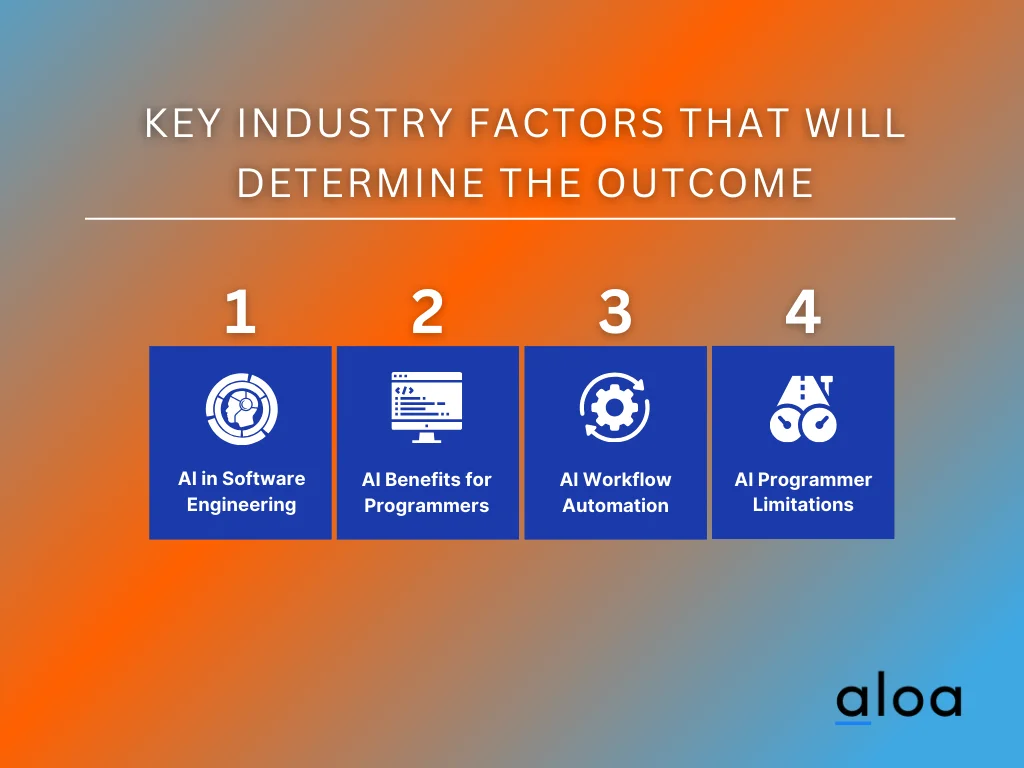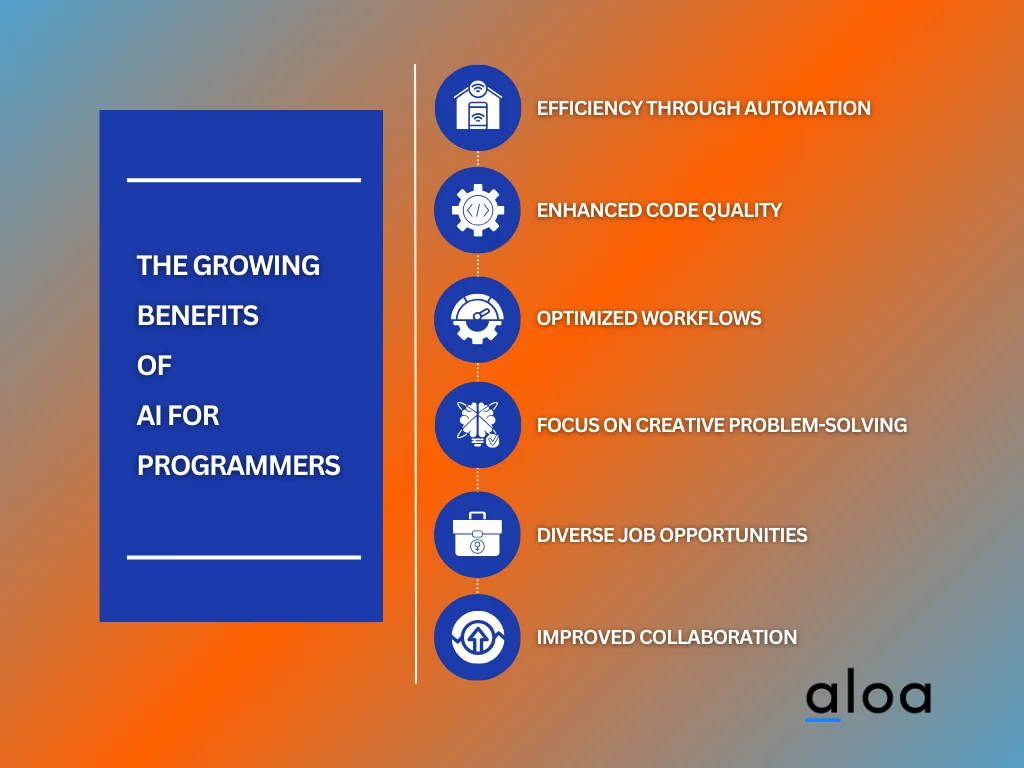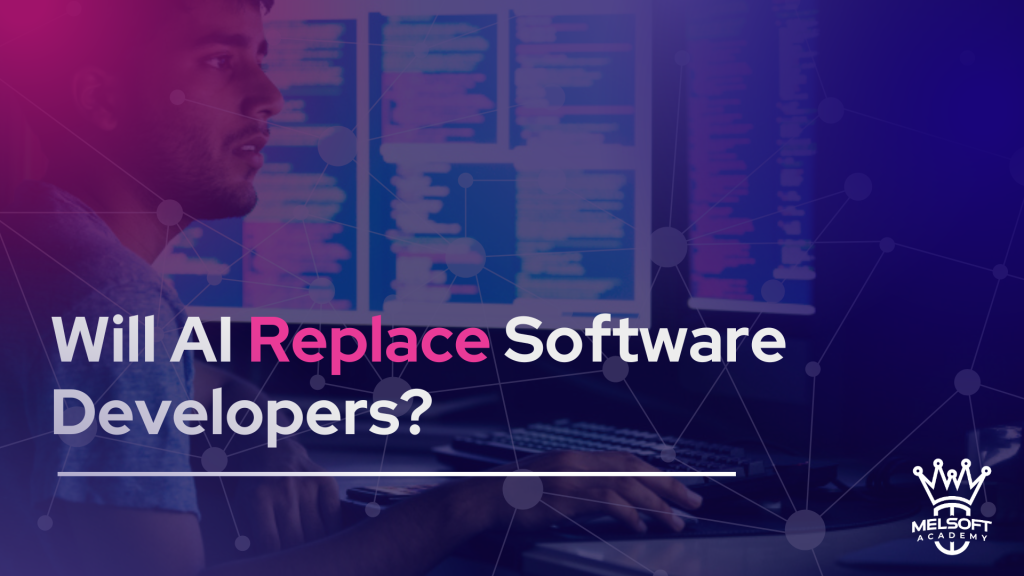AI is undeniably a potent tool in software development, excelling at optimizing and automating routine tasks. However, the notion that AI will entirely replace programmers is a misconception.
The synergy between AI and human developers is crucial for achieving optimal results. While AI excels at automation, human creativity, empathy, and problem-solving remain indispensable for driving innovation and building meaningful user experiences. This dynamic partnership empowers teams to tackle complex challenges and deliver exceptional software solutions.
Key Industry Factors Shaping the Future
As AI’s influence in software engineering grows, understanding the key factors driving its impact is essential for navigating the digital landscape. These factors will determine how AI transforms the industry and the opportunities it presents:
- Automation of Routine Tasks: AI streamlines repetitive tasks like code generation, testing, and debugging, freeing programmers to focus on strategic problem-solving and innovation.
- Optimization of Code Quality: AI-powered tools enhance code quality by detecting vulnerabilities, inefficiencies, and potential bugs.
- Data-Driven Decision Making: AI analyzes vast datasets to extract valuable insights, enabling data-driven decision-making throughout the software development lifecycle.
- Intelligent Debugging and Troubleshooting: AI-driven debugging tools accelerate problem-solving and improve software reliability.
- Personalized User Experiences: AI analyzes user behavior to deliver tailored experiences, enhancing user satisfaction and engagement.
- Continuous Learning and Adaptation: AI systems evolve through continuous learning, ensuring software remains relevant and competitive.
- Ethical and Regulatory Considerations: Addressing ethical concerns and regulatory requirements is crucial for responsible AI deployment.
- Future Perspectives and Innovations: Emerging AI technologies like AI-driven software synthesis and autonomous code generation hold immense potential for reshaping the software development landscape.

The Growing Benefits of AI for Programmers
Artificial Intelligence (AI) serves as a powerful tool for programmers, offering a multitude of advantages that enhance efficiency, code quality, creativity, job opportunities, collaboration, and more. Here are some key benefits that AI brings to the table in the realm of programming:
Efficiency Through Automation:
- AI plays a crucial role in optimizing workflows by automating repetitive tasks, thereby boosting overall productivity and precision.
- By automating tasks and providing valuable insights, AI enables programmers to focus on more strategic and creative aspects of their work.
Enhanced Code Quality:
- AI tools and algorithms help improve code quality by identifying and fixing bugs, vulnerabilities, and inefficiencies in the codebase.
- This leads to the development of more reliable, secure, and efficient software products.
Optimized Workflows:
- AI streamlines workflows by intelligently allocating tasks, tracking progress, and identifying bottlenecks in the development process.
- By optimizing workflows, AI contributes to increased productivity and better resource utilization.
Focus on Creative Problem-Solving:
- By handling routine and mundane tasks, AI frees up programmers to focus on creative problem-solving and innovation.
- AI provides data-driven insights that can guide developers in making informed decisions and developing novel solutions.
Diverse Job Opportunities:
- The integration of AI in programming creates new avenues for specialization in fields such as artificial intelligence, machine learning, data science, and more.
- Programmers skilled in AI technologies have access to a wide range of job opportunities in emerging tech sectors.
Improved Collaboration:
- AI facilitates collaboration among programmers and systems by providing tools for data analysis, decision-making support, and project management.
- By enhancing communication and information sharing, AI accelerates project delivery and improves overall team efficiency.
In conclusion, AI serves as a valuable ally for programmers, offering a range of benefits that enhance efficiency, code quality, creativity, job prospects, collaboration, and more. Embracing AI technologies can empower programmers to work more effectively, innovate more freely, and contribute to the development of cutting-edge software solutions in today’s dynamic tech landscape.

AI and Workflow Automation: A Partnership, Not a Replacement
AI and workflow automation enhance efficiency without replacing human programmers. They complement human skills by handling repetitive tasks and providing valuable insights. While AI is a powerful tool, human creativity, judgment, and problem-solving remain essential for software development success.
Key factors driving the effectiveness of AI and workflow automation include:
- Efficiency Enhancement: Automating tasks accelerates development and boosts productivity.
- Error Reduction: AI helps minimize human errors through continuous monitoring and intelligent decision-making.
- Data-Driven Insights: AI provides valuable insights for informed decision-making and optimization.
- Scalability: AI-powered solutions can adapt to growing project needs, ensuring consistent performance and reliability.
- Enhanced Collaboration: AI fosters collaboration through centralized platforms for communication and knowledge sharing.
- Continuous Improvement: AI systems learn and optimize processes over time, leading to ongoing improvements.
Limitations of AI in Replacing Human Programmers
Artificial Intelligence (AI) has made remarkable advancements in various fields, including programming. However, it still faces several limitations when it comes to completely replacing human programmers. Here are some key reasons why AI cannot fully replace human programmers:
- Creativity and Innovation: Human programmers bring a unique level of creativity and innovation to the table. They can think outside the box, come up with novel solutions to complex problems, and create groundbreaking software that pushes the boundaries of technology.
- Complex Problem-Solving: Humans excel at solving complex, ambiguous problems that require not just logical reasoning but also abstract thinking and contextual understanding. AI algorithms might struggle with the level of intuition and adaptability that humans naturally possess.
- Human Judgment and Contextual Understanding: Programmers possess human judgment, ethical considerations, and a holistic understanding of project requirements that AI systems may lack. Human programmers can weigh different options, consider ethical implications, and understand the broader context in which a software solution operates.
- Ethical and Social Implications: Human programmers are better equipped to address the ethical and social implications of software development. They can anticipate and mitigate potential biases, privacy concerns, and societal impacts that AI systems might overlook.
- Continuous Learning and Adaptation: Humans have the remarkable ability to continuously learn and adapt to new technologies, tools, and trends in the programming landscape. They can quickly pick up new skills and stay abreast of evolving industry standards, something that AI currently struggles to do without significant human intervention.
- Human Interaction and Communication: Effective communication and collaboration are key aspects of successful software development. Human programmers excel in these areas, as they can easily collaborate with team members, understand client requirements, and effectively convey complex technical concepts in a clear and concise manner.
- Handling Unforeseen and Unstructured Situations: Humans are adept at handling unforeseen challenges and adapting to rapidly changing circumstances. In dynamic environments where requirements are not always clear or situations are unstructured, human programmers can leverage their creativity, experience, and intuition to navigate and find solutions effectively.
While AI continues to advance and automate many aspects of programming, the unique capabilities of human programmers, including creativity, critical thinking, ethical considerations, and adaptability, ensure that their role remains indispensable in software development.
By understanding the strengths and limitations of both AI and human programmers, organizations can harness the power of AI to enhance software development processes while ensuring the continued importance of human expertise.


